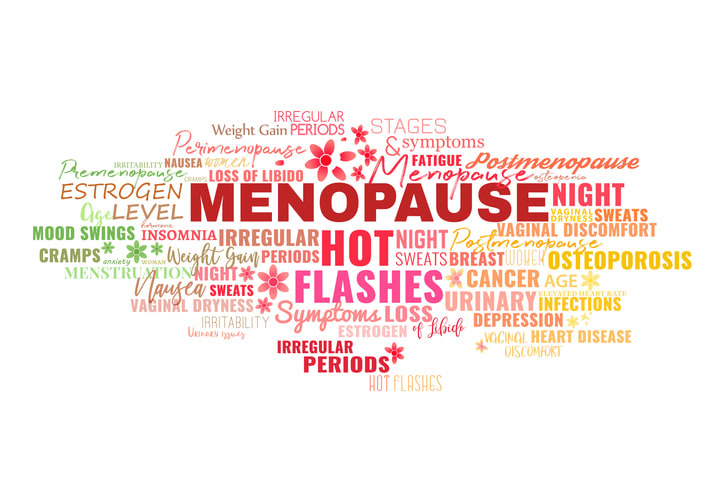Understanding the benefits and risks of hormone therapy

[3 MIN READ]
In this article:
- Menopause is a natural part of aging that occurs when your body slows production of the hormones estrogen and progesterone. It often causes a wide range of symptoms including night sweats, hot flashes and pain during sex.
- Hormone therapy was routinely prescribed during menopause until a study by the World Health Institute linked it to increased health risks more than 20 years ago and usage dropped dramatically.
- Current research indicates the health benefits of hormone therapy outweigh the risks. The Medical Director of Women’s Wellness & Specialty GYN Services explains what’s changed.
Does it sometimes feel like your internal temperature could power a blast furnace? Do night sweats interrupt your dreams on a regular basis? Has vaginal dryness and pain during intimacy limited – or prevented – your enjoyment during sex? Welcome to menopause!
Menopause is a natural biological part of aging that typically takes place between ages 45 and 55 when your body slows production of estrogen and progesterone. Your periods become irregular for several years and then stop completely. You have reached menopause when you have not had a period for 12 months in a row. Menopause also occurs immediately if you have surgery to remove your ovaries, chemotherapy or certain hormone-based cancer treatments.
There are three stages of transition to menopause, according to the Endocrine Society.
- Perimenopause begins several years before your last period. For some, that can happen as early as age 40, but most people usually begin perimenopause around age 47.
- Menopause takes place when it has been 12 months since your last period, with no spotting or bleeding during that time.
- Postmenopause occurs after menopause. During this stage your hormone levels remain low and you cannot become pregnant.
Some people barely notice their transition into menopause. Others experience severe symptoms that affect their physical, mental and sexual health. For them, hormone therapy could provide much-needed relief. But is it effective? Is it safe? Yes and yes, according to multiple research studies conducted over the past 20 years.
We talked to Dina Gordon, M.D., medical director of Women’s Wellness & Specialty GYN Services, about some of the common misconceptions surrounding hormone therapy and whether the benefits of treatment outweigh the risks. Here’s what she had to say.
Evolution of care
Hormone therapy consists of estrogen, progestin or a combination of the two. Depending on the type of hormone, it is available in several forms, including oral medication, transdermal patch, injection, nasal spray or cream.
For years, hormone therapy was used regularly to help reduce menopausal symptoms. Then in 2002, the Women’s Health Initiative released initial results of a clinical trial that showed a “small but significant increase in cardiac events as well as a higher incidence of breast cancer,” according to the North American Menopause Society. In response, hormone therapy use in the United States dropped dramatically as people became concerned about the risks it posed to their health.
“The Women’s Health Initiative was useful and gave us some real conclusions and information. But in its aftermath, a lot of people stopped getting hormones,” says Dr. Gordon. “It’s time to rethink hormone therapy. We know more now than we did then.”
Results from additional studies over the years, including a study published recently in JAMA, indicate the benefits of hormone therapy outweigh the risks in many cases.
Benefits and risks
Hormone therapy is approved by the U.S. Food and Drug Administration for the treatment of vasomotor symptoms, such as hot flashes and night sweats, prevention of bone loss and genitourinary syndrome.
Hormone therapy can:
- Reduce hot flashes and night sweats.
- Relieve vaginal dryness.
- Ease pain during sex.
- Reduce the likelihood of thin, weakened bones.
- Protect against heart disease.
- Prevent loss of muscle mass.
- Eliminate mood swings.
- Reduce memory loss.
“The other thing hormone therapy can really help with is perimenopause,” says Dr. Gordon. “It can help with mood stabilization. A lot of people get significant anxiety and depression during perimenopause that’s related to hormone changes. Hormone therapy can help that.”
According to the North American Menopause Society, you are a good candidate for hormone therapy if you:
- Are close to menopause.
- Are in good health.
- Do not have any serious health conditions, such as cancer, liver disease or heart disease.
- Do not have a history of blood clots.
Although it can have considerable health benefits, hormone therapy does contain risks. According to the Food and Drug Administration, you should not use hormone therapy if you:
- Think you could be pregnant.
- Experience vaginal bleeding.
- Have had certain types of cancer.
- Have ever had a heart attack or stroke.
- Tend to develop blood clots.
- Have liver disease
Hormone therapy and breast cancer
A common misconception about hormone therapy is that it can increase your chances of breast cancer. That’s simply not true, according to Dr. Gordon.
“Estrogen does not cause breast cancer. Estrogen protects against breast cancer,” she explains. “If you have an active breast cancer that’s hormonally sensitive, and they give you estrogen it’s going to stimulate growth of your cancer. That’s different from causing cancer. Estrogen alone is protective.”
“Progesterone may increase your risk of breast cancer, but, folks with a uterus need progesterone for protection against uterine cancer,” adds Dr. Gordon. “A menopause specialist can help you weigh the pros and cons of your care options to determine which one best meets your needs.”
Finding relief
Menopause symptoms are rarely dangerous to your health but that doesn’t mean they can’t disrupt your life.
“It’s time to find a menopause specialist when you're bothered by your symptoms. You don’t have to wait until they’re extreme,” she explains. “If you’re having night sweats or hot flashes that you would describe as at least moderate, hormone therapy is one of the options that you have.”
Learn more and find a physician or advanced practice clinician (APC)
A menopause specialist can help you navigate the changing health challenges you face during “the change of life.” The Swedish Women’s Wellness Program features a multidisciplinary team of gynecologists, surgeons and associated specialty health care providers working together to offer solutions during this ever-changing season of your life.
Whether you require an in-person visit or want to consult a doctor virtually, you have options. Contact Swedish Primary Care to schedule an appointment with a primary care provider. You can also connect virtually with your provider to review your symptoms, provide instruction and follow up as needed. And with Swedish ExpressCare Virtual you can receive treatment in minutes for common conditions such as colds, flu, urinary tract infections and more. You can use our provider directory to find a specialist or primary care physician near you.
Information for patients and visitors
Related resources
Sex can become painful after menopause. A Swedish expert offers some guidance.
The breakdown about osteoporosis and bone density testing
Perimenopause and menopause: myths, reality and how to cope
This information is not intended as a substitute for professional medical care. Always follow your health care professional’s instructions.



